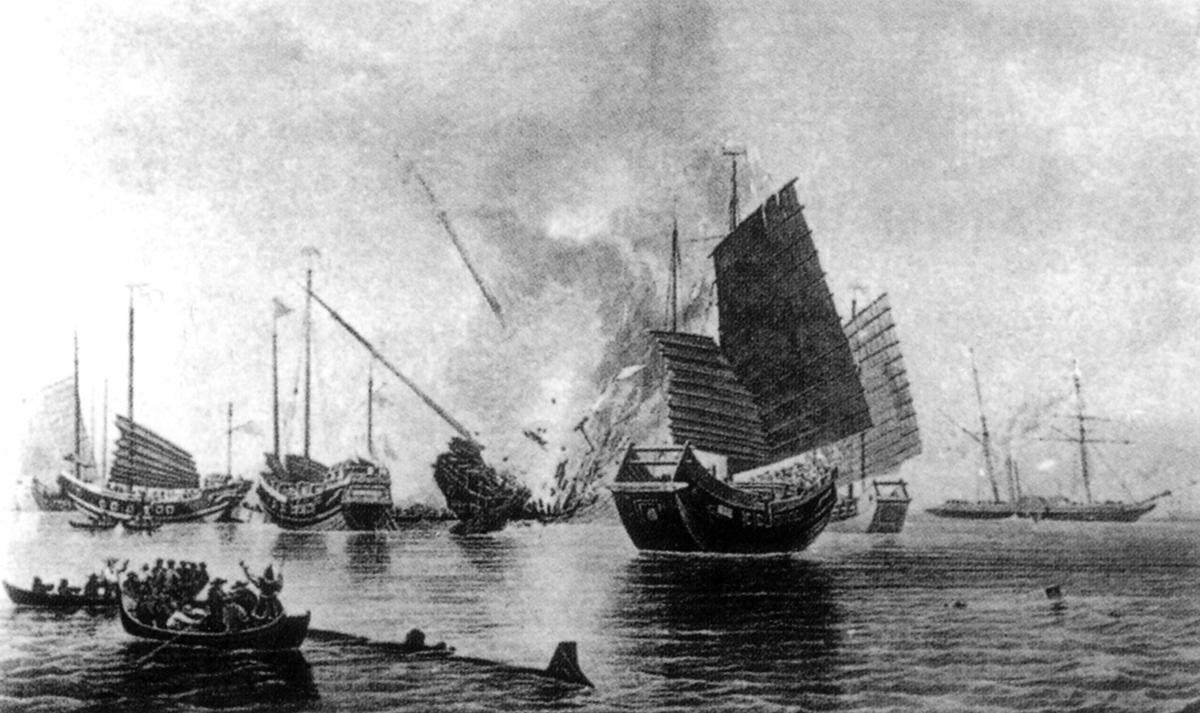More languages
More actions
(Created page with "{{Infobox military conflict|conflict=First Opium War|place=China|image=鸦片战争.jpeg|date=1840.6|result=British won|combatant1=Qing Empire|combatant2=United Kingdom}}The First Opium War (Chinese:第一次鸦片战争: Pinyin:dìyīcì yāpiàn zhànzhēng) is the British imperialist war of aggression against China that began in June 1840. == Timeline == =...") Tag: Visual edit |
No edit summary |
||
| (One intermediate revision by one other user not shown) | |||
| Line 1: | Line 1: | ||
{{Infobox military conflict|conflict=First Opium War|place=China|image=鸦片战争.jpeg|date=1840.6|result=British | {{Infobox military conflict|conflict=First Opium War|place=China|image=鸦片战争.jpeg|date=1840.6|result=British victory|combatant1=[[Qing Empire]]|combatant2=[[United Kingdom]]}}The First Opium War (Chinese:第一次鸦片战争: Pinyin: dìyīcì yāpiàn zhànzhēng) is the [[United Kingdom of Great Britain and Northern Ireland|British]] [[Imperialism|imperialist]] war of aggression against [[Qing dynasty (1636–1912)|China]] that began in June 1840. | ||
== Timeline == | == Timeline == | ||
| Line 12: | Line 12: | ||
== Results == | == Results == | ||
On August 29, 1842, the Treaty of Nanjing was signed between China and Britain. | On August 29, 1842, the Treaty of Nanjing was signed between China and Britain. It: | ||
# Ceded [[Hong Kong Special Administrative Region|Hong Kong]] island. | |||
# Compensated the British for the price of opium, commercial debts, and military expenses totaling twenty-one million silver dollars. | |||
# Opened five ports of commerce: [[Guangzhou]], [[Fuzhou]], [[Xiamen]], [[Ningbo]] and [[Shanghai]]; allowed British residents to live there and assigned consuls. | |||
# Agreed that British merchants should pay [[Tariff|import and export taxes and rates]] and that the Chinese customs had no right to autonomy. | |||
# Abolished of the thirteen hongs in [[Guangdong|Canton]], allowing British merchants to trade freely in China. | |||
[[Category:Pages needing references]] | |||
[[Category:History of China]] | |||
Latest revision as of 23:13, 5 October 2024
| First Opium War | |||||||
|---|---|---|---|---|---|---|---|
 | |||||||
| |||||||
| Belligerents | |||||||
| Qing Empire | United Kingdom | ||||||
The First Opium War (Chinese:第一次鸦片战争: Pinyin: dìyīcì yāpiàn zhànzhēng) is the British imperialist war of aggression against China that began in June 1840.
Timeline[edit | edit source]
Background[edit | edit source]
In the nineteenth century, China maintained a trade surplus with Britain, which greatly harmed the interests of British merchants. Britain began to smuggle opium into China for profit. The smuggling of opium cost China a lot of silver and the consumption of opium by a large number of people greatly affected the health of the Chinese people.
In March 1839, Lin Zexu arrived in Guangzhou to destroy opium.
Outbreak[edit | edit source]
In June 1840, 40 British warships with 4,000 soldiers arrived at the Chinese coast and blockaded Chinese ports.
Results[edit | edit source]
On August 29, 1842, the Treaty of Nanjing was signed between China and Britain. It:
- Ceded Hong Kong island.
- Compensated the British for the price of opium, commercial debts, and military expenses totaling twenty-one million silver dollars.
- Opened five ports of commerce: Guangzhou, Fuzhou, Xiamen, Ningbo and Shanghai; allowed British residents to live there and assigned consuls.
- Agreed that British merchants should pay import and export taxes and rates and that the Chinese customs had no right to autonomy.
- Abolished of the thirteen hongs in Canton, allowing British merchants to trade freely in China.
